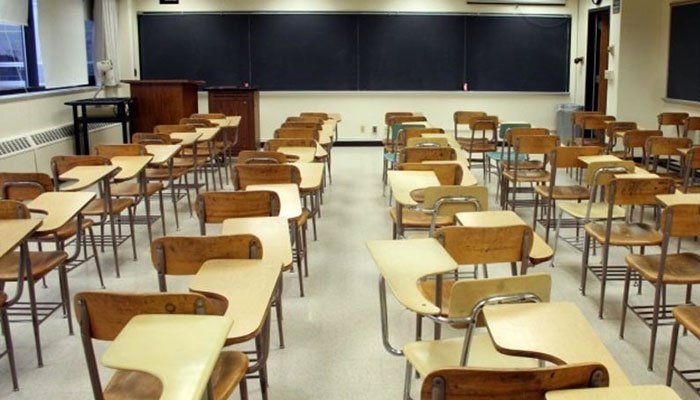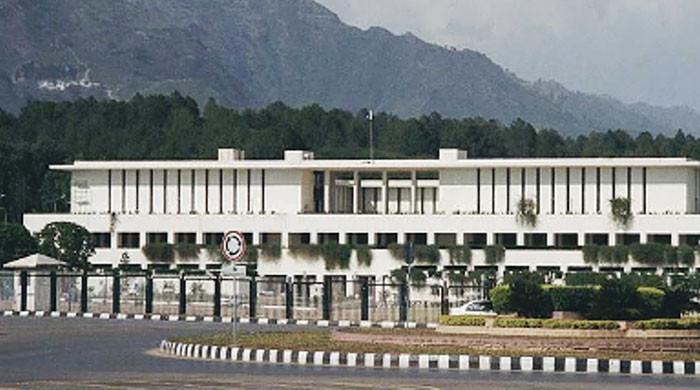COVID-19: Punjab govt issues SOPs for reopening educational institutes
Punjab govt reminds educational institutes against stigmatising students and staff members exposed to COVID-19
August 13, 2020

LAHORE: After the National Command and Operation Centre's (NCOC) decision to reopen education institutions from September 15 throughout the country, the Punjab government issues standard operating procedures (SOPs) and safety guidelines for campuses on Wednesday.
The recommendations were made by the Primary & Secondary Healthcare Department (P&SHD) on the recommendations of Technical Working Group (TWG) which were announced in a notification.
The notification said that the environment at schools and education institutions can cause transmission of COVID-19. The provincial health department called on education institutes to ensure that students and staff members exposed to the virus should not be stigmatised and remember that coronavirus "does not differentiate between ethnicities, disability status, age or gender".
The government has asked educational institutes to have a system in place to identify and isolate students as well as staff members who may contract COVID-19. It called on the management to encourage students to wash hands for 40 seconds with soap and water, and sanitise hands for 20 seconds.
The health department urged teachers to educate students about precautions from contracting COVID-19 especially when it came to touching shared surfaces like doorknobs, furniture, chair arms, tables, books, computer equipment audio/video equipment, game tools/devices, and other communal use items.
Institutes have been directed to maintain a sufficient stocks of soaps and sanitisers and hand them out to teachers and students.
The notification, with regard to respiratory etiquettes, said that students or staff with symptoms of respiratory infections should be isolated and advised to stay at home until cured. The government said that wearing of face mask/covering during lectures and gatherings should be advised.
Schools and education institutes have been directed to ensure strict face mask/face cover compliance where inter-person spatial distance is less than six feet and that students should be educated and trained on mandatory compliance to cover their face with arm fold, tissue or handkerchief while sneezing or coughing.
Face mask/cover should remain intact while talking to others especially when safe distance is not observed; removal of mask may cause spread of droplets and pose a risk for virus transmission; avoid touching and exchange mask/face covering; wash/sanitize hands if contaminated while coughing/sneezing or touching mask; maintain sufficient stock of masks/face cover at school and provided to staff and students if needed, said the notification.
The health department called on schools to ensure that desks are fixed to the floor, seats are marked for each student and teachers advise students not to change their allotted seats. It said that management should ensure that students are advised not to shake hands or hug other students; line and social distance discipline should be implemented for entry and leaving school or classrooms.
Ensure six feet inter-student distance all the time; schools with large number of students should use multiple gates for entry and exit to ensure safe distancing and avoid crowd, stated the notification.
Schools have also been advised to avoid the morning assembly during the current pandemic; Playgroup, KG, Nursery classes involving younger kids, play area, toys, etc should be avoided; ensure seating of students and staff 6 feet apart in classrooms, library rooms, staff room, laboratory and other commonly used areas, stated the notification.
School vans/buses/rickshaws/transport were asked to "strictly abide" with 50% occupancy of seating capacity to stem the spread of the virus. School administrations have been asked to monitor its implementation in letter and spirit; boarding/hostel occupancy should be reduced to 30% of total capacity.
With regard to cleanliness and disinfection, the administration must ensure cleanliness and disinfection of school and boarding buildings three to five days before opening, especially if the school/hostel building remained in use for quarantine purpose for COVID-19 patients; follow standard procedure such as cleaning the surface to make it dirt/dust free then wipe with 1% freshly prepared sodium hypochlorite solution.
Students should keep their own drinking cup and not share with other fellows; sharing of learning tools, devices, equipment (pen, paper, stationary, etc should be avoided, stated the health department.
If anybody is identified/reported with these symptoms, educational institutes have been advised to call 1033 for guidance; ensure daily temperature checking with thermal scanners at entry; entrants who develop any upper respiratory symptoms or fever should be immediately separated and referred for medical checkup; students/ staff suffering from fever or cough should stay at home; school attendance should be monitored to record absenteeism due to fever or acute cough sickness; health log book for all students and staff should be maintained; any cluster of more than five fever or acute cough cases from same locality should be reported to the respective District Health Authority/DDHO or UC Medical Officers/or 1033 helpline.
Schools have been advised to hold sessions in groups of a maximum number of 10 participants and that teachers should conduct daily session on COVID-19 prevention. Students may be assigned to prepare posters, speeches and essays on COVID-19, deploy volunteers in each class to monitor compliance of COVID-19 SOPs and help younger children observe precautions, said the provincial department.
Originally published in The News











